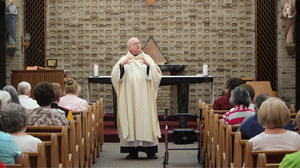Sirach 35:12-14, 16-18
2 Timothy 4:6-8, 16-18
Luke 18:9-14
Reflection:
When I was at Catholic Theological Union in Chicago studying theology, I took my Early Church History course from a Ukrainian Catholic priest, whose name I believe was Andrei Chirovsky (I can’t swear on the spelling). The course involved looking at how the early church settled various questions of doctrine and belief. And so Fr. Chirovsky gave us a definition of heresy that still makes a lot of sense to me. Heresy was not defined so much as falsehood, but as emphasizing one aspect of the truth to the exclusion of another. For instance, take the doctrine of Jesus Christ as the Incarnation of the Son of God. We believe Jesus to be both human and divine. A heresy would be to emphasize the divinity of Jesus to the exclusion of His humanity, and vice versa.
I was thinking about this as I reflected on the parable we hear in Sunday’s Gospel reading from Luke (18:9-14), and why Jesus told it: “Jesus addressed this parable to those who were convinced of their own righteousness and despised everyone else.” The parable is about a Pharisee and a tax collector who happen to be at the temple area at the same time. The Pharisee thanks God that he isn’t like everyone else, especially the tax collector he sees there. He also boasts about how faithful he is in fasting and tithing. Meanwhile the tax collector humbly beats his breast and asks for God’s mercy. What might have been shocking for His audience to hear, Jesus says that the tax collector, not the Pharisee, was the one who went home “justified.” The Pharisee could see the truth of God’s love for himself, but to the exclusion of seeing the truth of God’s love for the tax collector, even though the tax collector sinned. Or to put it another way, the Pharisee could see the truth of the tax collector’s sin while ignoring the truth of his own.
As we move to Election Day in the U.S., I think Jesus’ words may give us pause and a caution not to fall into the “heresy” of the Pharisee in the parable. Once again, I am reminded of Martin Luther Kings’ take on agape, which he gave in a speech before the Fellowship of the Concerned on November 16, 1961:
Agape is understanding, creative redemptive good will to all men. It is an overflowing love which seeks nothing in return. Theologians would say that it is the love of God operating in the human heart. So that one rises to love on this level, he loves men not because he likes them, not because their ways appeal to him, but he loves every man because God loves them. And he rises to the point of loving the person who does an evil deed while hating the deed that the person does. I think this is what Jesus meant when he said “love your enemies.” I’m very happy that he didn’t say like your enemies, because it is pretty difficult to like some people. … But Jesus says love them, and love is greater than like. Love is understanding, redemptive creative, good will for all.
To follow Jesus is to live in the whole truth: Not only does God love us, God loves all. May God’s love strengthen us, as it did St. Paul, which we hear in our second reading from 2 Timothy (4:6-8, 16-18), and like St. Paul, may the proclamation of the truth of God’s love for the world in Jesus Christ be “completed” through us!
Fr. Phil Paxton, C.P., is the local superior at St. Paul of the Cross Passionist Community in Detroit, Michigan.

